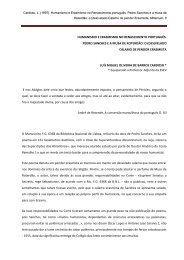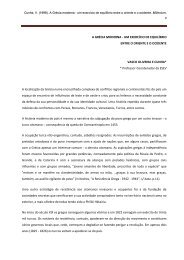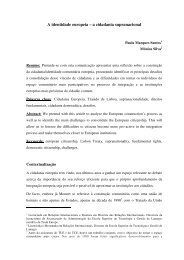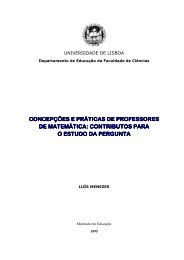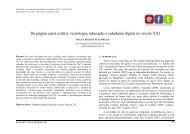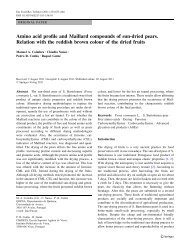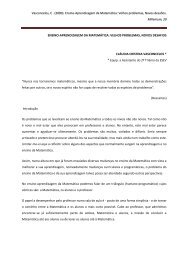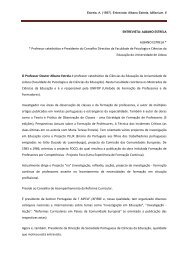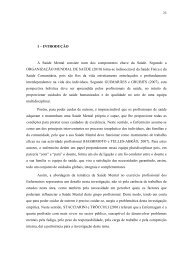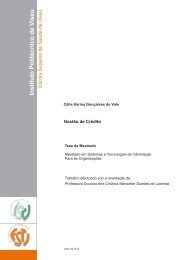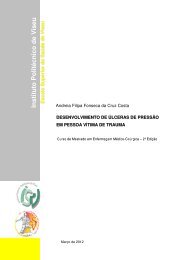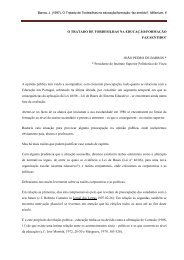Wit, H. (1998). <strong>Rationales</strong> <strong>for</strong> <strong>Internationalisation</strong> of Higher Education. Millenium, 113. Historical development of rationales’ dominanceIn the course of the history of higher education, in European medieval times and in the Arab universityworld even be<strong>for</strong>e, academic and social/cultural rationales were dominant: the wandering scholarlooking <strong>for</strong> knowledge and understanding of other cultures.These rationales, although less dominant now, have always been and still are present in highereducation.But later, during the process of the development of the nation-state and its colonial expansion, politicalrationales became more and more present. By copying the European models of higher education in thecolonies in the Americas, Africa and Asia, the European nations were looking <strong>for</strong> political, cultural,economic and academic dominance, of which most nations and their universities are still trying toescape.With the rise of political and economic influence of the United States of America as an internationalpower in this century, and in particular after the Second World War, this political rationale got a newdimension. To maintain and expand its influence, knowledge of other cultures, languages and systems,became of crucial importance.Universities in the United States were stimulated with federal funding, mainly from budgets of The SateDepartment and the Defence Department, to develop area studies, <strong>for</strong>eign language training and studyabroad.Although seen in the rest of the world by many as a sign of American imperialism -matched by a similartrend in the <strong>for</strong>mer Soviet Union-, it was presented as a stimulus of peace and mutual understanding.Quotes of senators and presidents of the post war period make that clear.Senator Fulbright spoke of educational exchange as, "from the standpoint of future world peace andorder, probably the most important and potentially rewarding of our <strong>for</strong>eign policy activities."And he was followed by others such as president George Bush, saying in 1989 still: "Internationalexchanges are not a great tide to sweep away all difference. But they will slowly wear away obstacles topeace as surely as water wears away a hard stone."
Wit, H. (1998). <strong>Rationales</strong> <strong>for</strong> <strong>Internationalisation</strong> of Higher Education. Millenium, 11This optimistic view on international education as a way of peace making <strong>for</strong>ce, has been dominant inAmerican politics and higher education in the past fifty years, still is rather wide spread there and hasfound supporters elsewhere. For instance, the present policy statement of the International Associationof University Presidents speaks of "promoting vigorously the internationalisation of their institutionsand the global competence and literacy of their students as being essential to the long term pursuit of amore peaceful world where international understanding and co-operation in solving problems will beincreasingly critical <strong>for</strong> the quality of life and sustained economic, social and cultural development."Although it is quite tempting to sympathise with such a view of internationalisation of higher education,one, in my view, should be careful with such a pure political rationale <strong>for</strong> internationalisation. Who’speace is it and who’s understanding of the world? Was and is higher education in the rest of the world inthe position to place its understanding on equal terms with that of the American and Europeanacademic world? Does such a view provide space <strong>for</strong> an own national identity?In our comparative study of internationalisation strategies in Asia Pacific countries, Jane Knight and I didfind as one of the most clear rationales <strong>for</strong> internationalisation of higher education, not so much globalidentity but national identity. (1997, 23-27) By becoming part of a global environment on more equalterms, higher education and society can move away from dependency and dominance of westerntechnology, western means and languages of instruction. Not <strong>for</strong> instance the expansion of English aslanguage of instruction -an issue in several European continental higher education institutions-, but theoption of local languages of instruction -in replacement of the colonial, mainly English language, aheritage from the past, is an international strategic issue in several Asian countries and universities.This local or national impact of internationalisation seems to have become overshadowed in Europe andthe United States, where globalisation and uni<strong>for</strong>mity seem more dominant. Still, already in 1952, theCzech born political scientist Karl Wolfgang Deutsch wrote, at Harvard: "there is an excellent changethat among the hundreds and thousands of <strong>for</strong>eign students at the universities today there may be aconsiderable number of young men and women who may go back one day to their countries with adeeper emotional attachment to their own nation and often with a deeper nationalism than the onewith which they came".Many national leaders have had their education abroad, and, in that other cultural environment,became more attached to their own national identity than be<strong>for</strong>e. International education is not only aconfrontation with the other but also, and maybe even more, with the own culture.



